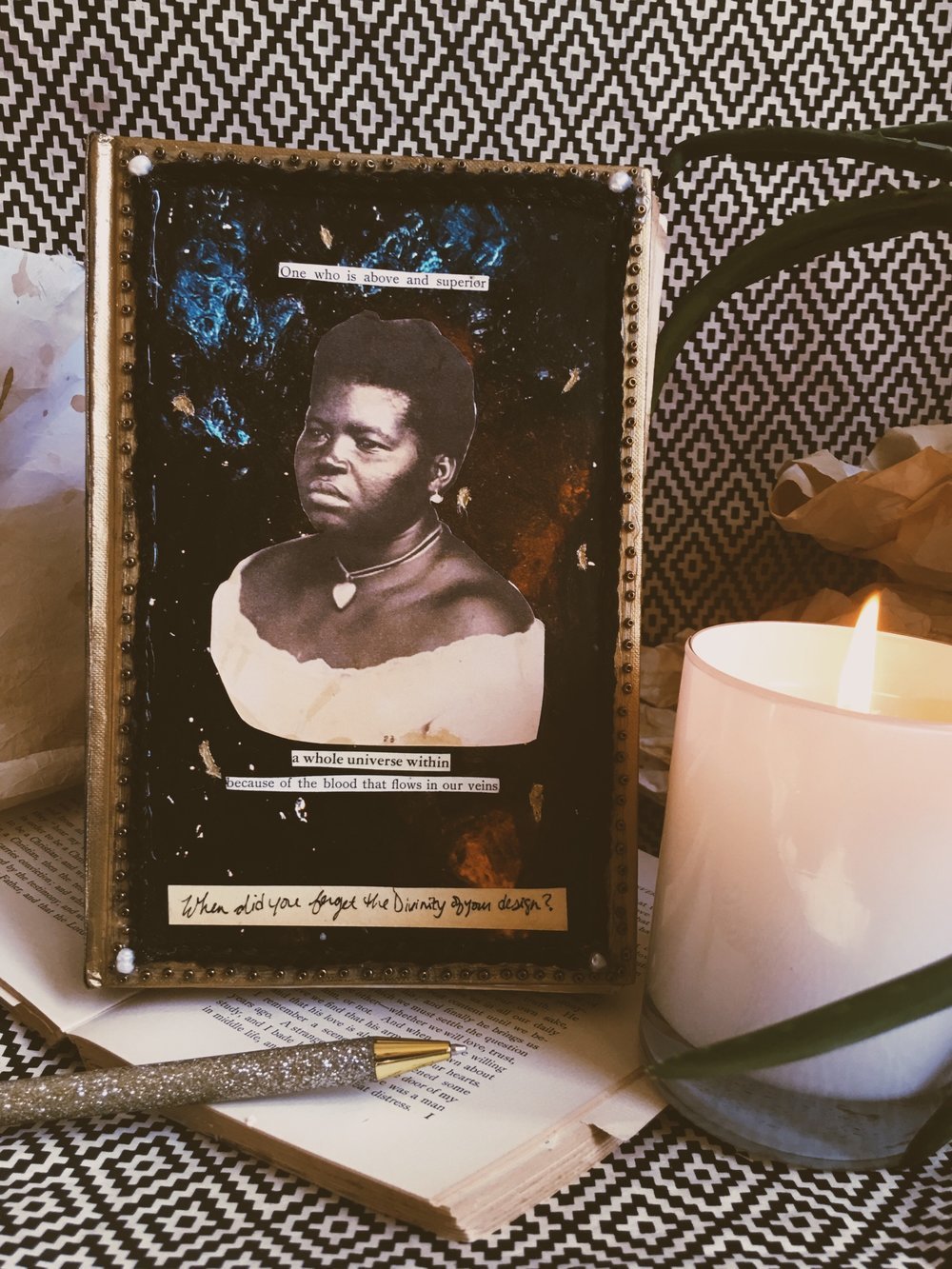Towards Historicizing…
The new collection of hardcover journals, GENES,SIS concerns our critical need to define western culture’s multigenerational impacts on our lives, connect with its toxicity and respond with dewesternization. As teastained women we have to force ourselves to live in the state of constant remembering that Western culture is an unrepentant, violent society that was founded upon its violence towards our respective cultures transformed centuries later into an cognitively dissociated idea of “freedom”. In turn, this culture is designed to keep us base and amnesiac; money-worshipping, irreverent, insouciant, hypersexed and matriarchally myopic. Western culture wreacked havoc on our lands/cultures and in return it expects us to forget its horrors and merely assimilate, selling our richness for pennies along the way. And the cost of such assimilation we lose not just ourselves but also our cultural mandates on this planet—we lose our stories and histories. In resistance, we must return to our origins, our cultures, our books, our way of telling time—and our book-writing.
Journaling is the closest in proximity for us to collect and archive our histories. But how can we dewesternized our book-writing practice, as expressed through journaling? We must disconnect it from the colonial objective to voyeurise and document violations of humanity; to ramble on the trivialities of our day to day while stripping the present tense of its radicality. To dewesternize our journaling practice it is imperative for we teastained women to preserve our narratives with cultural memory, disobeying the Western agenda to operate at the low vibration of singularity and to extend our gaze into the future while engaging in studying who and what we come from, what are our cultural and spiritual mandates. We must preserve our cultures in real time. We must reclaim journaling from the white male’s narcissistic documentary practice to remember all the peoples he’s killed off and the lands he has stolen. It is our role as original times-tellers and storykeepers to redirect journaling from the silliness of notebook collecting; from “Harriet the Spy” style jots that dehumanize our loved ones, those we observe or situations we are too young and/or inexperienced to truly overstand. It is our role to redirect the journaling practice from sad accunts of times regretted that we end up hiding from our descendants, from weak ramblings that accomplish nothing beyond the moment they are written.
Dewesternizing our journals means coming into the remembrance of who we are— our nonwestern identities as melanated peoples. To reiterate: we are the original times-keepers and calendar makers. We are the original historians. Our handwritten books have always been used to teach our descendants how to interact with the Creator, our earthly inheritance and its terms, parables for general morality, protection from evil, how to occupy our time on this planet, etc. Our peoples used their books to teach the next generation to take their place. Our books preserve our cultures; they are documents of guidelines for children’s children to follow so they can prevail in the ways of our peoples. And today our journals should be written to continue this tradition.
Enslavement and colonization; being killed off and experiencing injustices have been major interruptors in our historicizing practice: our journals contain reactions to these violences instead of words for our cultural futurism. And this isn’t a problem, as these live witness accounts are also history. But as time goes on Western culture has built up a system of assimilation where we get jobs and paychecks and get to watch tv and use social media on our $1500 phones but be clueless as to how it’s maintaining our mental suppression, docility. We’ve gone from passion for the cultures we represent and vehemence against Western systems’ violence towards us, to being pacified and domesticated by its cheap baubles like college, 9-5s, fake money, christianity, and media. We have been literally and physically drugged. As a consequence, our books have gone unwritten.
But there’s still time. We must become the next generation of historicizing scribes who will dedicate ourselves, cultural rememberings and decisive intellects to mental sobriety and abstaining from Western culture’s cheap thrills. We must be able to document obvious and obscured agendas in this culture of vileness and death so the next generation won’t make the same mistakes—so they can have code to subvert it and keep their sanity.
This means our journal writings must change. And thus we have the next phase in journal-keeping for teastained women in this period of time. The new direction to be headed as Black and brown diarists: away from writing about our mere day to day and towards writing for the next generation of ourselves, our progeny, our cultures. We must move towards filling journals with writings that can function as history books with multiple layers of insights on identity, the times, and ideas for how we must be present for our tomorrows. This turns diaries into holy books.
No more documenting selfish ramblings that won’t do work in the lives of our future generations. No more writing about what’s bothering us when we have time and AUTHORity to write about shifting our mindsets and shifting our atmospheres to become the women we were predestined to be—and then embody this in real time. Such insights will build the DNA of our daughters and sons. We have to shift our journaling towards historicizing so that we can actually function as history-makers. Because our written words have that power.
How do we change the way we journal so that our journals are useful, futuristic artefacts.
document strategies from struggles
document spiritual revelations
document insights on the foolishness happening during your day.
archive powerful memories about generational curses you’re operating to eradicate and generational blessings you’re setting into place.
document your spiritual trials and how you overcame them.
document all you’re fasting from until you lose a taste for it—sugary foods, crappy music, random sex partners, toxic mindsets.
document your changing your conversation from English language curses (like “good morning” and “hello”) to wholistic life-giving language.
If we interject such themes into our journal entries, our journals will transform into multigenerational history books. This is how we go from merely journaling and towards historicizing.
blessings
chimene




